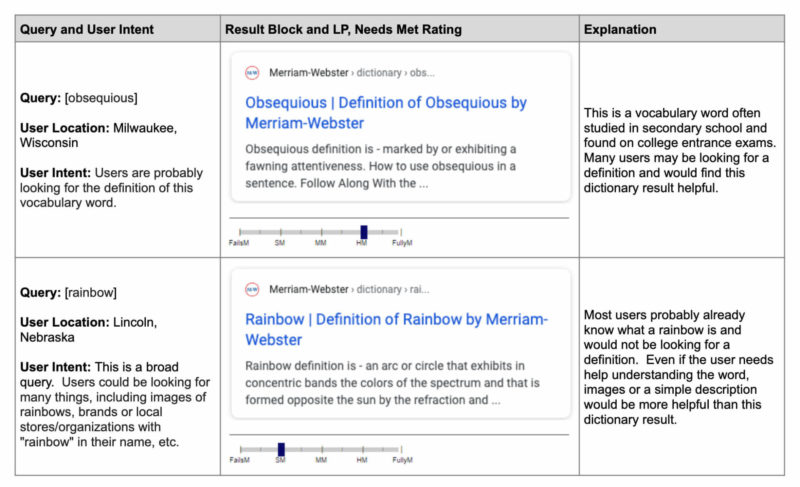Google search quality guidelines update breaks down dictionary and encyclopedia results and more
Google added a new section for rating dictionary and encyclopedia results for different queries, emphasizes the importance of understanding the user intent and query.
After 10 months since the last update to the Search Quality Raters guidelines (PDF), Google has pushed out another update. The update came out Wednesday night. The Search Quality Raters guidelines document is now 175 pages, up from 168 at the last update on December 5, 2019.
What is new? Here is a change log of what is new in this document:
- Added note to clarify that ratings do not directly impact order of search results.
- Emphasized ‘The Role of Examples in these Guidelines‘ as an independent section in the introduction.
- Added clarification that Special Content Result Blocks may have links to landing pages; added illustrative example.
- Updated guidance on how to rate pages with malware warnings and when to assign the Did Not Load flag; added illustrative examples.
- Changed the order of Rating Flags section and Relationship between Page Quality and Needs Met section for clarity.
- Added ‘Rating Dictionary and Encyclopedia Results for Different Queries‘: Emphasizes the importance of understanding the user intent and query for Needs Met rating; added illustrative examples.
- Minor changes throughout such as updated examples and explanations for consistency; simplified language regarding raters representing people in their locale; fixed typos; etc.
Rating Dictionary and Encyclopedia Results for Different Queries section. There is a new section for dictionary and encyclopedia results. It says, “When assigning Needs Met ratings for dictionary and encyclopedia results, careful attention must be paid to the user intent. Like all results, the helpfulness of dictionary and encyclopedia results depend on the query and user intent. Dictionary and encyclopedia results may be topically relevant for many searches, but often these results are not helpful for common words that most people in your rating locale already understand. Reserve high Needs Met ratings for dictionary and encyclopedia results when the user intent for the query is likely ‘what is it’ or ‘what does it mean’ and the result is helpful for users seeking that type of information.”
Here is an example from the document:

Why we care. Although search quality evaluators’ ratings do not directly impact rankings (as Google clarified in the document), they do provide feedback that helps Google improve its algorithms. Google made updates to the guidelines ten months ago, adding more information on diverse background and then before that, adding more detailed directions regarding interstitial pages and content creator expertise, and bucketing “E-A-T” (Expertise, Authoritativeness, Trustworthiness) within “Page Quality” in certain sections.
Here we learn more about how Google handles dictionary-like results.
Related stories